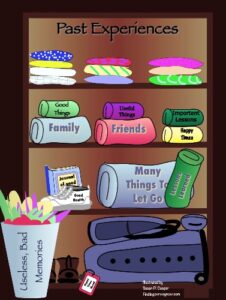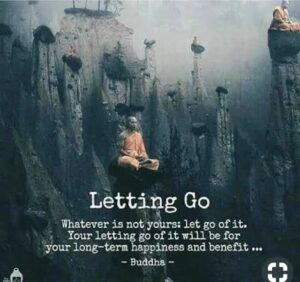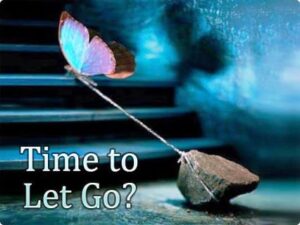THE INCREDIBLE POWER OF LETTING-GO
Decluttering tips in Gretchen Rubin’s “Outer order, inner calm,” which I had finished reading the previous night, were still swarming and cluttering my mind when I began packing my bags for a trip to the USA in the second week of November this year. As I dug into my wardrobe, I realised I had accumulated an awful lot of stuff over the years. I also realised that most of the things were lying untouched. I had neither used nor missed them before or during the pandemic. So I subjected the stuff lying with me to three questions which Ms Rubin lays out in her book – “Do I use it? Do I need it? Do I love it?” And if the answer to all three queries turned out to be no, I got rid of the stuff, which is how I ended up giving away four sack loads of clothes, old books, old electronics, old files and papers to the needy. Doing that proved to be a liberating experience for me. We all have so much stuff to go, but the fear that we would need the things at some point, or miss them later, or the thought of the item developing some magical future use makes us cling to it. While cleaning out my closet, I uncovered a metaphor. Like the physical stuff we hold on to, we in mental space hold on to the stories we tell ourselves, old identities that we don’t identify with anymore, toxic relationships, etc. Most of which don’t serve us.

To unearth things that were not serving me and holding me back, I had to take an inventory of my mental space to let go of things holding me back. A quick scroll through my mental space disclosed that I had inadvertently rented my mental real estate to some old beliefs and a couple of mental constructs that were probably not serving me. The first thing that showed up during the analysis was an awareness that I was holding onto a couple of unpleasant things like the recent death of my dog and the collapse of the wall on my beachside property that was preventing me from fully experiencing life.

My predicament was probably akin to the story of three men with sacks that I had read long ago. The story goes that there lived three men named Raja, Saji and Ram, each of whom had two sacks, one tied in the front and the other at the back. When Raja got asked to describe his sacks, he replied that he had filled the sack in his back with all good and pleasant things while the bag in the front had all the negative things that had happened to him. Now and then, Raja would open his sack in the front, examine his dark negative life, and think about it. Because he focussed on the negative, Raja’s life was full of unhappiness.
On the other hand, Saji had all the good things filled in the front sack and all the mistakes and wrongs on the back sack. When Ram got asked about his sacks, he replied that he had kept all the good deeds and blessings of the people in his front sack and the back sack was empty with nothing in it as he had cut a big hole at the bottom. Therefore, all the bad things that went into his back sack fell out, so there was no weight. As Ram’s mind was delinked from negative and focused on blessings, his life was joyful and blissful. To lead a happy, joyful life, we may have to identify with Ram and remember all the gifts while acknowledging and letting go of negativity and judgment toward others like the back sack of Ram.

Further, during the course of our life we stay stuck in negativity because we hold on to resentments and hatred towards others without embracing forgiveness, which could’ve been something presumably akin to the story of two monks. While returning to their monastery, two monks come across a stream possessing a solid current that a terrified beautiful young girl is scared to cross. Noticing the predicament of the pretty girl, the elder of the two lifts her and swiftly carries her to the other side. Both continue their journey afterwards to the monastery. Later in the evening, the younger monk comes to the older monk and demands how a monk could touch a woman. The elder monk smiles at him and replies that he had left the woman by the riverside hours ago. But the younger monk was still carrying her in his mind. In life, we all have unpleasant situations in which we tend to hold on to instead of letting go. Still, despite such circumstances, like the senior monk, it would be better to forgive people, drop resentments and remorse, and move on with life.

The second revelation that confronted me while journaling was the existence of an unconscious mental pattern of clinging to thought forms and things. In Buddhism, letting go does not mean letting go of things; it means letting go of our clinging to whatever. To do that, one would have to drop all clinging. It may not be easy to let go of the clinging, while life circumstances may force a few to a fate akin to that of the dewdrop. In an old story, a dewdrop that lay shining like a pearl atop a leaf skidded to the edge of the leaf because of a strong breeze. Terrified of falling and getting smashed, the drop desperately tried holding on to the leaf. But, unable to cling on, it surrenders to gravity, trusting the unknown. Suddenly, fear gives way for deep joy as the tiny dewdrop free falls and merges with the vastness of the pond into which it dropped. The dewdrop was no more, but it did not get destroyed either. Instead, it had become one with the whole. Letting go means relinquishing the ego, non-attachment to outcomes, surrendering desires, accepting the present, and letting life unfold like a rose without forcing anything

We are always full of desires. Cravings are potent when we allow them to run our lives. Desires, when unfulfilled, make us miserable. We want to go to exotic places, meet new people, eat gourmet food, and have abundant wealth and good things in life. We tend to mistake desires as needs. We suffer because of our attachment to people, places, or things. We cling to people or something because we believe they will make us happy. A man enchanted by a woman feels that he derives happiness from his partner, and life would be miserable without her. We are not aware that we are merely trying to fill the emptiness or void within us when we look for happiness outside of ourselves. We tend to mistake desires as needs. Desires, when unfulfilled, make us miserable. But when we examine the desires properly and learn what they are, letting go of them becomes easy. Therefore, letting go means not seeking or attaching ourselves to something outside for acceptance, love, security, or joy. Letting go is surrender and radical acceptance of others, irrespective of how they are or seem to be and our life situation. All the attachments and cravings will drop once we rely on our inner resources and we begin filling our inner emptiness from within. Because only when we accept what is can we transform ourselves.

 Finally, letting go is about trusting life or some greater power permeating this universe. Here is a case in point. A rock climber in the mountains’ heights got lost and could see nothing as the night fell heavy. Suddenly, he slipped and started falling at great speed. He suddenly felt the rope tied to his waist pull him hard. His body was hanging in the air. Helpless, he screamed, “Help me, God.” And God replied, “Cut the rope tied to your waist. The rock climber at that moment refused to trust the voice and continued holding on to the string. The following day, the rescue team reported that they had found a climber dead and frozen, his body hanging from a rope. His hands held tight to the cord -just one foot above the ground. Unlike the mountain climber, we may have to detach ourselves from the ropes binding us. We have to let go of the unreal and hold on to the real, which is eternal and all-pervading, as letting go brings relief, ease, joy, and love by rooting out suffering.
Finally, letting go is about trusting life or some greater power permeating this universe. Here is a case in point. A rock climber in the mountains’ heights got lost and could see nothing as the night fell heavy. Suddenly, he slipped and started falling at great speed. He suddenly felt the rope tied to his waist pull him hard. His body was hanging in the air. Helpless, he screamed, “Help me, God.” And God replied, “Cut the rope tied to your waist. The rock climber at that moment refused to trust the voice and continued holding on to the string. The following day, the rescue team reported that they had found a climber dead and frozen, his body hanging from a rope. His hands held tight to the cord -just one foot above the ground. Unlike the mountain climber, we may have to detach ourselves from the ropes binding us. We have to let go of the unreal and hold on to the real, which is eternal and all-pervading, as letting go brings relief, ease, joy, and love by rooting out suffering.
Source from: epaper/dtnext/chennai/dt:26.12.2021
 Dr.K. Jayanth Murali is an IPS Officer belonging to 1991 batch. He is borne on Tamil Nadu cadre. He lives with his family in Chennai, India. He is currently serving the Government of Tamil Nadu as Additional Director General of Police, Idol Wing CID.
Dr.K. Jayanth Murali is an IPS Officer belonging to 1991 batch. He is borne on Tamil Nadu cadre. He lives with his family in Chennai, India. He is currently serving the Government of Tamil Nadu as Additional Director General of Police, Idol Wing CID.
